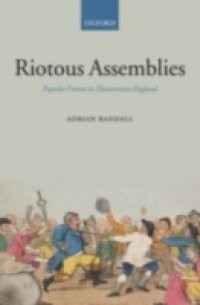Riotous Assemblies examines eighteenth- and early nineteenth-century England through the lens of popular disorder. Tackling both the more closely-studied forms of protest, such as food riots, industrial disorders, and political disturbances, and much less well understood occasions of popular disorder, such as tax riots, turnpike riots, riots against the establishment of the militia, and religious riot, Adrian Randall re-engages the study of riot within awider interpretation of the forces - social, economic and political - which were transforming society. He pays particular attention to disturbances in the years between 1795 and 1812, critically examining how far they indicated the major discontinuities discerned by earlier histories of protest, or whether theyretained much of the character of earlier upheaval. Based upon detailed case studies and drawing upon the most recent research, the book extends the focus of earlier studies of protest. It locates the origins of disorder within the concepts of constitutionalism and the free-born Englishman, and argues that older attitudes proved far more tenacious than many have allowed.

